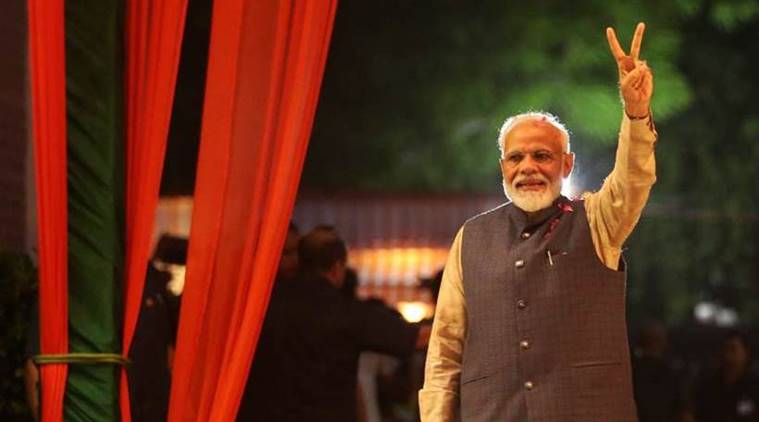The cover story in Organiser says that the voters rejected the politics of dynasty, caste and, above all, the divisive politics of an unholy “mahamilavat”.
About the BJP’s thumping victory in the Lok Sabha polls, the cover story in Organiser claims that the final outcome proves that Prime Minister Narendra Modi’s way of working not only won the elections, but also the hearts of the people. It says that the voters rejected the politics of dynasty, caste and, above all, the divisive politics of an unholy “mahamilavat”. The article asserts that these results prove how Modi successfully built a strong base of new supporters from every section of the society — from urban to rural, first-time voters, women, the deprived and the backward classes, without any discrimination of class, creed, region or language. “That is why when different political parties formed alliances on the basis of caste and creed, the so-called political pundits predicted their victory, calculating 1+1=2, then the BJP president Amit Shah claimed that this simple plus-minus math would not work in these elections; instead, the chemistry of inclusive politics will work. The results have proved Amit Shah is right,” the story says. It adds that from the Jana Sangh days to the present times the BJP and its leadership have been very much clear about “no compromise on national security”. It further asserts that PM Modi follows “the same line and is determined to resolve the problem. However, some hostile forces in the country support terrorism and the ‘Tukde-Tukde gang’ but the voters have now outrightly rejected all such elements. Now, this is an appropriate time to eliminate such anti-national forces”.
Role of RSS
An article by the RSS-affiliated Bharatiya Mazdoor Sangh’s (BMS) president, Saji Narayanan CK, in Organiser, highlights the role of the RSS behind BJP’s continuation in power under Narendra Modi’s leadership. The article reads that it is not an accident of history that a new political leadership under Modi came to power in 2014 and got even more strengthened in the 2019 elections. “It is a manifestation of the national asmita (identity) in the field of governance. It was scripted by the culmination of the activities of the Sangh movement working for the resurgence of India for the last 94 years in various facets of the national life,” states the article. It adds that Nehru and his inheritors — who were symbolic of Indians in appearance and Europeans in thinking — failed to shape the destiny of this nation. “It is this background of history that has paved the entry of Shri Narendra Modi in national politics like a tsunami,” claims the article.
The article cites two major reasons for the nationalist forces coming back with more strength. “One, the inspiring political leadership of Prime Minister Narendra Modi, two, the silent cadre work of RSS and its associated organisations which have their roots in every nook and corner of India. There is not even a weak substitute for it at present. It gives the indication that the new change will continue in future too,” the article claims. The article then goes on to claim that, “The Sangh and its movements are committed to achieve the ultimate glory of this nation. Hence, this God-given political opportunity should not be wasted on petty things”.
Idea of Bharat
In the context of Prime Minister Narendra Modi’s address to BJP workers and the nation after registering victory in the general elections for the 17th Lok Sabha, an editorial in Organiser says that the PM’s remarks call for some introspection. The editorial claims that it was not just a political speech but a speech of a true civilised statesman. It goes on to add that “though governments are formed with the majority, the country has to be run with consensus” and that the “most critical aspect of the new narrative for new Bharat is this emerging consensus about the Idea of Bharat. One may like to interpret and decipher this tremendous triumph of the Modi-led BJP in various ways; what we cannot forget is the emergence of this new narrative”.
The editorial further claims that the defeat of personalities like Rahul Gandhi, Jyotiraditya Scindia and Deepender Singh Hooda is a strong message to end “fiefdom politics”. It is also quick to add that the caste-based leaders can no longer consider their caste groups as vote-banks. On the other hand, argues the editorial, the victory of Smriti Irani in the Nehru-Gandhi bastion of Amethi, is the symbol of hard work and commitment to the cause. “The so-called ‘Khan Market’ consensus based on the elitist approach is irrelevant for the masses and the aspirations of new Bharat,” claims the editorial.
Compiled by Lalmani Verma
Source: Read Full Article


